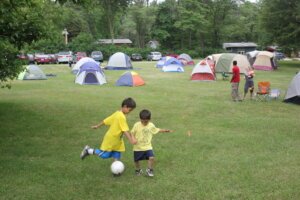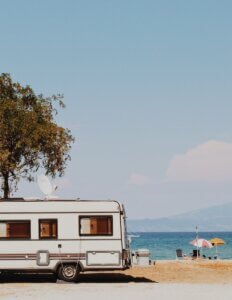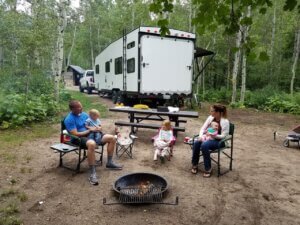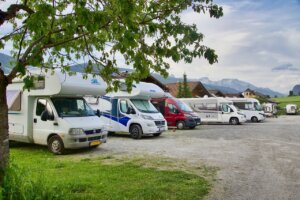Are you ready to embark on your first solo camping adventure? Before you head out into the great outdoors, it’s important to be well-prepared. In this article, you will find 10 essential tips that will help you navigate the challenges and make the most of your experience as a beginner solo camper. From choosing the right campsite to packing efficiently and staying safe, these tips will ensure that you have a successful and enjoyable time in nature. So grab your tent, strap on your backpack, and let’s get started on this exciting journey!
Choosing the Right Campsite
Research available campsites
When choosing a campsite, it’s essential to do some research beforehand. Look for campsites in your desired location and read reviews from other campers. Take note of any amenities offered, such as showers, toilets, and picnic areas. Additionally, consider the type of camping experience you’re looking for. Do you prefer a more secluded and peaceful setting, or do you enjoy being closer to other campers? By researching and comparing different campsites, you can find the perfect spot that suits your preferences.
Consider safety and accessibility
Safety should be a top priority when selecting a campsite. Look for campsites that have established fire rings and designated areas for pitching tents. These features help minimize the risk of wildfires and ensure that your camp is set up in a safe location. Additionally, consider the accessibility of the campsite. If you have any mobility concerns or are traveling with equipment that requires easy access, choose a campsite that offers paved paths and accessible facilities.
Evaluate the amenities
Amenities can greatly enhance your camping experience, especially if you’re a beginner. Look for campsites that offer amenities such as clean restrooms, showers, and potable water. These facilities can provide a sense of comfort and convenience during your camping trip. Additionally, some campsites may have picnic tables and firewood available for purchase, saving you the hassle of bringing your own. Evaluating the available amenities will ensure that you have everything you need for a comfortable stay.
Check for any restrictions
Before finalizing your campsite choice, check for any restrictions that may be in place. Some campsites may have limitations on pets, campfire usage, or noise levels. It’s important to be aware of these restrictions and ensure that they align with your planned activities. By doing so, you can avoid any potential conflicts and have a smoother camping experience.
Packing the Essentials
Map and navigation tools
One of the essential items to pack for your camping trip is a map or navigation tools. Even if you’re familiar with the area, having a physical map can provide a sense of security and help you navigate in case of any unexpected situations. Additionally, consider bringing a compass or GPS device to assist with orienteering and ensure you stay on track during hikes or explorations.
Appropriate clothing and footwear
When it comes to camping, proper clothing and footwear are crucial. Pack clothing suitable for the weather conditions you’ll be facing during your trip. Layering is key, as it allows you to adjust your clothing based on the temperature changes throughout the day. Don’t forget to pack enough socks and underwear, as well as a waterproof jacket and sturdy hiking boots for outdoor activities.
Sleeping gear
Getting a good night’s sleep is essential for an enjoyable camping experience. Invest in a high-quality sleeping bag and a comfortable sleeping pad or air mattress to ensure you rest well at night. Consider the temperature rating of the sleeping bag to match the expected weather conditions. Additionally, bring a pillow or choose a camping pillow designed for outdoor use to maximize your comfort.
Food and water supplies
Properly planning and packing your food and water supplies is crucial for a successful camping trip. Make sure to bring enough food to sustain you throughout your stay, taking into consideration any dietary restrictions or preferences. Opt for non-perishable items that are easy to prepare and require minimal cooking equipment. Additionally, pack enough drinking water or bring water purification methods to ensure a safe and reliable water source.
Cooking equipment
If you plan on cooking your meals at the campsite, packing the right cooking equipment is essential. Consider bringing a portable stove or camping grill, as well as cookware such as pots, pans, and utensils. Don’t forget to pack aluminum foil, ziplock bags, and reusable containers for food storage. Make sure your cooking equipment is lightweight and easy to transport to avoid unnecessary burdens.
First aid kit
Being prepared for any minor injuries or emergencies is crucial when camping. Pack a well-stocked first aid kit that includes essentials such as band-aids, antiseptic ointment, gauze pads, adhesive tape, and pain relievers. Additionally, consider any specific medications you may need and ensure you have an ample supply for the duration of your camping trip. It’s better to be safe than sorry, and having a comprehensive first aid kit will give you peace of mind.
Setting Up Camp
Pitching a tent
Once you arrive at your chosen campsite, it’s time to set up your tent. Start by choosing a flat and level area for pitching your tent to ensure a comfortable sleeping surface. Clear away any rocks or debris that may puncture the tent floor. Follow the instructions provided with your tent to properly assemble and secure it. Make sure the rainfly is properly attached to protect against any unexpected rain showers. Take your time to ensure the tent is properly anchored, as it will be your shelter for the duration of your camping trip.
Setting up a campfire
A campfire is not only a practical source of warmth and light but also a symbol of a classic camping experience. Before building a campfire, check with the campsite for any specific rules or restrictions regarding fires. Choose a safe location for the campfire away from any overhanging branches or flammable materials. Clear a circle of at least ten feet around the fire pit and gather rocks to create a containment area. Start the fire using firestarter or small twigs, gradually adding larger pieces of wood as it grows. Remember to never leave the campfire unattended and always fully extinguish it before leaving or going to sleep.
Creating a designated cooking area
To ensure efficient and safe cooking, it’s essential to create a designated cooking area at your campsite. This area should be separate from the main camping area to avoid any accidents or spills near the tent. Choose a flat and stable surface for your stove or camping grill, away from any flammable materials. If possible, set up a cooking station with a table or pop-up canopy for shade and protection from the elements. Keep all cooking supplies organized and easily accessible to make meal preparation a breeze.
Arranging sleeping gear
After setting up your tent, it’s time to arrange your sleeping gear for maximum comfort. Lay out your sleeping pad or air mattress inside the tent, ensuring it is centered and as level as possible. Place your sleeping bag on top of the pad, ensuring it is properly opened and ready for use. Consider using a sleeping bag liner or blanket for added warmth and comfort. Arrange your pillows and any additional blankets or sleeping accessories as desired. Taking the time to properly arrange your sleeping gear will make for a peaceful and restful night’s sleep.
Organizing campsite
An organized campsite not only enhances the overall aesthetics but also makes your camping experience more enjoyable. Take a few moments to tidy up the area around your tent, clearing away any unnecessary clutter or debris. Use storage containers or dry bags to keep your gear neatly organized and easily accessible. Hang up wet clothes or towels to dry or use a clothesline if available. By maintaining a well-organized campsite, you’ll be able to easily find what you need and create a comfortable living space.
Staying Safe in the Wilderness
Inform someone about your plans
When embarking on a solo camping trip, it’s crucial to inform someone about your plans. Share your itinerary with a trusted friend or family member, including details such as your campsite location, expected duration of stay, and any planned activities or hikes. Provide them with your contact information and establish a check-in system to ensure they are aware of your well-being. This simple precaution can provide an additional layer of safety and peace of mind during your solo camping adventure.
Understand local wildlife and plants
Familiarizing yourself with the local wildlife and plants is important for both your safety and the preservation of the natural environment. Research any potentially dangerous animals or insects that are native to the area and learn how to identify them. Take note of any poisonous plants and know how to avoid contact with them. By understanding the local wildlife and plants, you can better navigate your surroundings and minimize any potential risks.
Practice fire safety
Building a campfire is an enjoyable part of the camping experience, but it’s essential to practice proper fire safety. Always follow the campsite rules and restrictions regarding fires. Ensure your campfire is in a safe location and avoid building it during strong winds or extremely dry conditions. Keep a bucket of water or a fire extinguisher nearby to quickly extinguish the fire if needed. Never leave the campfire unattended and fully extinguish it before leaving or going to sleep. By practicing fire safety, you can prevent accidents and protect the surrounding wilderness.
Carry emergency supplies
Being prepared for emergencies is crucial when camping in the wilderness. Pack a well-equipped emergency kit that includes essentials such as a flashlight, extra batteries, a whistle, a multi-tool, a waterproof poncho, and a portable phone charger. Additionally, consider carrying a personal locator beacon (PLB) or a satellite messenger device for added safety. Familiarize yourself with how these devices work and ensure they are in proper working condition before your trip. By carrying emergency supplies, you’ll be better prepared to handle unexpected situations.
Be cautious of weather conditions
When camping in the wilderness, weather conditions can change rapidly, so it’s important to be cautious and prepared. Check the weather forecast before your trip and pack appropriate clothing and gear accordingly. Watch out for signs of changing weather while camping, such as darkening skies, increasing winds, or sudden temperature drops. If severe weather is predicted, consider altering your plans or seeking shelter until conditions improve. Being aware of weather conditions and taking necessary precautions will help keep you safe and comfortable during your camping adventure.
Leave No Trace Principles
Plan ahead and prepare
Planning ahead and being prepared is one of the fundamental principles of Leave No Trace. Research the rules and regulations of the area you’ll be camping in and make sure you have the necessary permits or reservations. Plan your meals, activities, and routes to minimize waste and impact on the environment. Be prepared for emergencies by carrying essential supplies and knowing how to use them. By planning ahead and preparing, you can minimize the potential impact on the natural surroundings.
Dispose of waste properly
Properly disposing of waste is crucial to maintaining the cleanliness and natural beauty of the wilderness. Pack out what you pack in, including all food wrappers, plastic bottles, and trash. Use designated trash receptacles if available or bring your own trash bags to collect your waste. If necessary, bury human waste at least six to eight inches deep and away from water sources. Avoid throwing any organic food waste into the environment as it can disrupt wildlife habitats. By disposing of waste properly, you contribute to preserving the pristine nature of the wilderness.
Leave what you find
Leave what you find is a principle that emphasizes the importance of preserving the natural environment. Avoid taking souvenirs or removing any natural objects, such as rocks, plants, or artifacts. Respect the natural beauty and integrity of the area by observing and appreciating it without leaving a mark. By leaving what you find, you ensure that future campers can enjoy the same untouched beauty.
Minimize campfire impacts
Campfires can have a significant impact on the environment, so it’s important to minimize the impact while enjoying the warmth and ambiance they provide. Always comply with campsite guidelines for campfire usage. Use established fire rings or fire pits, if available, to minimize the scars left behind. Avoid cutting live trees or breaking branches for firewood and instead bring your own or use dead and downed wood. Burn only small, manageable pieces of wood to minimize the amount of ashes and charred remnants. By being mindful of your campfire impacts, you contribute to the preservation of the natural surroundings.
Respect wildlife
Respecting wildlife is crucial for their well-being and the preservation of their natural habitats. Observe wildlife from a safe distance and never approach, feed, or disturb them. Keep food and trash stored securely to prevent attracting wildlife to your campsite. Avoid any actions that may disrupt or alter their natural behaviors. By respecting wildlife, you ensure their continued existence and the balance of the ecosystem.
Be considerate of other campers
When camping in shared areas, it’s important to be considerate of other campers and respect their experience. Keep noise levels to a minimum, especially during quiet hours. Observe any posted rules or guidelines regarding campsite etiquette. Be respectful of other campers’ privacy and space, avoiding walking through their campsites. By being considerate of other campers, you contribute to a positive and enjoyable camping environment for everyone.
Campfire Safety
Choose a safe location for the campfire
Campfire safety starts with choosing a safe location for your fire. Look for a spot that is clear of any overhanging branches, highly flammable materials, or dry grass. Clear a circle of at least ten feet around the fire pit to create a safe buffer zone. Ensure there are no low-hanging power lines or other hazards in the vicinity. By choosing a safe location, you minimize the risk of unintentional fires and potential accidents.
Keep a safe distance from flammable materials
During campfire setup and maintenance, it’s important to keep a safe distance from any flammable materials. Avoid setting up your campfire near tents, trees, shrubs, or other flammable objects. Be mindful of the direction of the wind, as embers can easily be carried and ignite nearby materials. By keeping a safe distance from flammable materials, you reduce the risk of spreading the fire unintentionally.
Extinguish the fire completely before leaving
Before leaving your campsite or going to sleep, it’s crucial to extinguish the campfire completely. Start by pouring water over the fire, ensuring all flames are extinguished. Use a shovel or stick to stir the ashes, making sure to wet all the embers thoroughly. Continue adding water and stirring until the ashes are cool to the touch. Once the fire is completely out, use the back of your hand to check for any remaining heat. Only leave the campfire site when you are certain it is completely extinguished. Properly extinguishing the fire minimizes the risk of spreading and prevents potential wildfires.
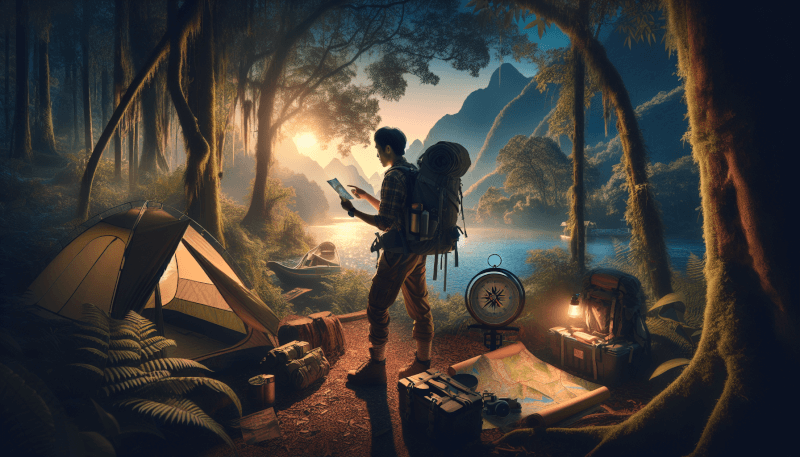
Building Outdoor Skills
Learning basic navigation
Basic navigation skills are essential for outdoor adventures. Familiarize yourself with map reading, compass usage, and GPS devices. Practice orienteering in different terrains and learn how to interpret topographical maps. By learning basic navigation skills, you’ll feel more confident and prepared during your camping trips.
Mastering fire building techniques
Building a fire is a fundamental outdoor skill that every camper should master. Learn different fire building techniques, such as the teepee, lean-to, or log cabin methods. Practice starting fires using various fire starters, such as matches or lighters, as well as natural materials like twigs and bark. Mastering fire building techniques ensures you can create a reliable and safe fire when needed.
Identifying edible plants and wild edibles
Knowing how to identify edible plants and wild edibles is a valuable skill for self-sufficiency in the wilderness. Research the local flora and learn to identify edible plants and berries in the area you’ll be camping in. Familiarize yourself with poisonous plants to avoid any potential risks. Take a guided foraging tour or attend a workshop to gain hands-on experience and learn from experts. By acquiring this skill, you can supplement your food supplies and embrace a more sustainable camping experience.
Learning how to purify water
Having the ability to purify water is crucial for a safe and enjoyable camping trip. Learn different water purification techniques, such as using water filters, iodine tablets, or boiling water. Practice these methods in different scenarios to ensure you can obtain safe drinking water from various sources. By learning how to purify water, you can alleviate concerns about finding a clean water source during your camping adventures.
Improving outdoor cooking skills
Outdoor cooking can be a delightful part of the camping experience. Improve your outdoor cooking skills by trying new recipes, experimenting with campfire cooking techniques, and learning to use camping stoves effectively. Invest in quality cookware and utensils designed for outdoor use. Attend cooking workshops or join camping groups to exchange tips and tricks. By improving your outdoor cooking skills, you can elevate your camping meals and enjoy delicious and satisfying food in the wilderness.
Stay Entertained and Engaged
Bring books or e-books
Solo camping provides ample opportunity for relaxation and self-reflection. Bring along your favorite books or e-books to immerse yourself in captivating stories or gain knowledge through educational reads. Whether you prefer fiction, non-fiction, or self-help books, having some reading material will keep you entertained during quieter moments of your camping trip.
Pack playing cards or travel-sized games
Playing cards or travel-sized games are perfect for solo campers to pass the time or enjoy friendly competitions. Card games like solitaire or poker can provide hours of entertainment. Travel-sized board games like chess or Scrabble are also great options. These games are compact and easy to pack, ensuring you have entertainment options to enjoy at your campsite.
Explore nearby hiking trails
Solo camping is an excellent opportunity to explore nearby hiking trails and connect with nature. Research the local trails in your chosen camping location and plan hikes that suit your fitness level and preferences. Ensure you have proper hiking gear, including appropriate footwear and a backpack with water and snacks. Take your time to immerse yourself in the beauty of the surroundings and enjoy the peace and serenity that nature offers.
Engage in photography
Capture the beauty of nature and create lasting memories by engaging in photography during your camping trips. Bring along your camera or smartphone and experiment with different angles, lighting, and compositions. Practice landscape photography, wildlife photography, or even astrophotography during nighttime. Photographs taken during solo camping trips are not only a way to document your experiences but also a source of inspiration and a means of sharing your adventure with others.
Stargaze and learn about constellations
Take advantage of the clear night skies in the wilderness and spend some time stargazing during your camping trip. Bring a star chart or use a stargazing app to identify constellations, planets, and other celestial objects. Educate yourself about the stories and mythology behind the stars, and make it a goal to learn a few new constellations on each trip. Stargazing can be a peaceful and awe-inspiring activity that connects you with the vastness of the universe.
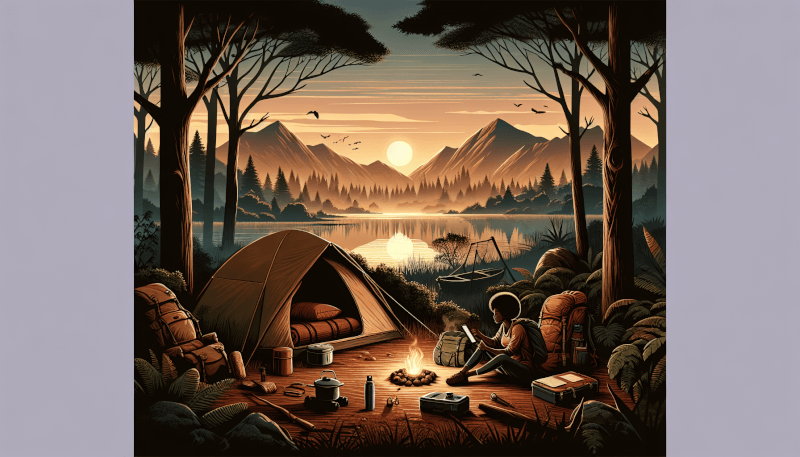
Practice Good Hygiene
Keep hands clean
Maintaining good hygiene is essential when camping in the wilderness. Keeping your hands clean helps prevent the spread of germs and diseases. Pack hand sanitizer or biodegradable soap and use them before handling food, after using the restroom, or whenever your hands are dirty. Prioritize hand hygiene to ensure a healthy and pleasant camping experience.
Bring biodegradable soap
When using soap for cleaning dishes, cooking utensils, or personal hygiene, opt for biodegradable soap. Biodegradable soap is specially formulated to break down naturally, minimizing its impact on the environment. Avoid using regular soap, which may contain harmful chemicals that can pollute natural water sources. By choosing biodegradable soap, you contribute to the preservation of the wilderness and leave a minimal environmental footprint.
Dispose of waste properly
Proper waste disposal is crucial for maintaining cleanliness and minimizing the impact on the environment. Pack trash bags to collect any non-biodegradable waste, such as food packaging, plastic bottles, and wrappers. Dispose of these waste items in designated trash receptacles if available or pack them out with you. Dispose of organic waste, such as food scraps, in a responsible manner, ensuring they are buried at least six to eight inches deep and away from water sources. By disposing of waste properly, you contribute to the overall cleanliness and preservation of the wilderness.
Use eco-friendly personal care products
When choosing personal care products for camping, opt for eco-friendly options. Look for biodegradable toiletries, such as shampoo, conditioner, and body wash, that will not harm the environment when rinsed away. Use minimal amounts of these products to avoid excess runoff. Consider using reusable and washable towels or wipes instead of single-use disposable wipes. By using eco-friendly personal care products, you reduce your impact on the wilderness and promote a more sustainable camping experience.
Embrace the Solo Experience
Connect with nature
Solo camping allows for a unique connection with nature that can be deeply rewarding. Take the time to observe and appreciate the natural beauty around you. Listen to the sounds of the wilderness, whether it’s the rustling of leaves, the songs of birds, or the babbling of a nearby stream. Disconnect from the distractions of everyday life and allow yourself to fully immerse in the serenity of nature.
Savor solitude and self-reflection
Solo camping provides an opportunity to embrace solitude and engage in self-reflection. Use this time to disconnect from the hustle and bustle of daily life and reconnect with yourself. Reflect on your goals, accomplishments, and personal growth. Take this time to recharge and prioritize self-care. Embrace the solitude and use it as an opportunity for self-discovery and introspection.
Challenge yourself
Solo camping is an excellent opportunity to challenge yourself and step out of your comfort zone. Push your limits by taking on more challenging hikes or outdoor activities. Try new camping techniques or learn a new outdoor skill. Embrace the unknown and face any fears or doubts head-on. Challenging yourself during solo camping can lead to personal growth and a newfound sense of confidence.
Develop self-sufficiency
Solo camping provides an ideal environment for developing self-sufficiency and independence. Take on tasks that you would typically rely on others for, such as setting up camp, cooking meals, or navigating trails. Embrace the responsibility and challenge yourself to become self-reliant. Developing self-sufficiency during solo camping not only enhances your outdoor skills but also increases your confidence and resilience.
In conclusion, embarking on a solo camping trip can be an incredibly rewarding experience. By choosing the right campsite, packing the essentials, setting up camp properly, and staying safe in the wilderness, you can ensure a safe and enjoyable adventure. Adhering to the principles of Leave No Trace, practicing campfire safety, building outdoor skills, and staying entertained will enhance your camping experience. Embrace the opportunity for self-reflection, self-sufficiency, and personal growth that solo camping provides. With proper planning, preparation, and a positive attitude, you’re ready to embark on an unforgettable outdoor adventure.


